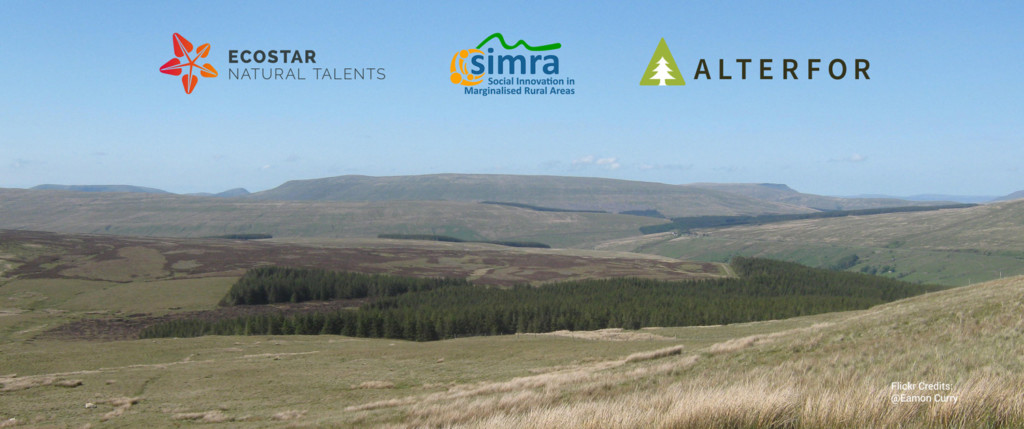Evaluating, predicting and making innovation happen in forestry and rural areas!
Three projects are underway and in their maturity on a Europe-wide scale:
- SIMRA*– discovering and assessing social innovation. The first framework for assessing and enhancing social innovation in marginalized rural areas where the aim is to fill the significant knowledge gap in understanding and enhancing social innovation in marginalised rural areas by advancing the state-of-the-art in social innovation and connected governance mechanisms in agriculture and forestry sectors and in rural development in general.
- ECOSTAR – innovating through entrepreneurship. It is the research-enterprise impact hub and accelerator that promotes entrepreneurship and innovation for nature-based businesses. The initiative is promoted by a university-enterprise partnership between European and US-based institutions, and it is co-funded by the Erasmus+ Programme of the European Union, and other private investors.
- ALTERFOR – predicting future needs and innovation in forestry. The main goal of ALTERFOR is to provide improved and new approaches in forest management that are robust enough to address the challenges of the 21st century. These challenges range from uncertainties of climate change and the complex dynamics of evolving global markets to the pressures for increased use of bioenergy.
Giving wings to new approaches:
Despite the importance and relevance to ecosystem services and their future management of their individual objectives, the projects have a number of synergies. All three are projects co-funded by the European Commission. SIMRA* and ALTERFOR are Horizon 2020 projects, where research and innovation are fundamental to project success emphasizing “excellent science, industrial leadership and tackling societal challenges”. ECOSTAR is an Erasmus+ Knowledge Alliance project that seeks to promote business innovation and links between universities and businesses; “strengthening Europe’s innovation capacity and fostering innovation in higher education, business and the broader socio-economic environment.” Each has been successful as they offer new approaches to how ecosystem services are being managed and translated into business models. ECOSTAR seeks to improve innovation in business development in gaps and scalability from ideas in Markets and Economics of Ecosystems and Biodiversity (MEEB) to developing business. Not too far away from this, SIMRA* seeks to assess and enhance social innovation opportunities and how to support them. Finally, ALTERFOR, being a little more research-based, intents to implement innovative forest management models to deliver ecosystem services.
Unifying undervalued sectors
In recent years, the importance of creating connections to highlight the multifunctionality of sectors, which have been traditionally undervalued in Europe, is increasing. Indeed, this undervaluation in a traditional sector, such as the forestry sector, is clear from a study recently carried out by ETIFOR for the ECOSTAR project; an entrepreneurship training needs assessment among EU forest and environmental university departments. The importance given to innovation in these three projects is clear; evident in case studies presented in the first ever innovation report for nature-based businesses published by ECOSTAR; evident also in the typology of case studies that SIMRA* has begun to assess. What is also evident, is the importance of connecting the different services that forests and other ecosystems have to offer, including both their natural and social capital. ECOSTAR does this through its goal of business development under its theme “Nature-Based”, where ECOSTAR has gone so far as to create a new sector “Nature-Based”, created to give scaling up opportunities to ideas in ecosystems and biodiversity. These ideas are given shape by applicants to the first ever business development e-learning course for the same sectors. SIMRA* does this by first identifying and then seeking to enhance the governance and social innovation in such services, more specifically focussing on the cultural and social services and ALTERFOR, more technically, aims to improve the science of the models that measure such services, although it more specifically focusses on forest management, to improve their delivery.
Playing host to first meetings
ECOSTAR has already met SIMRA*, and the meeting went successfully. Indeed, apart from promotional and communicative support between the two projects and continuous sharing of ideas and opportunities, one of the more useful outcomes was to potentially give opportunity to the cases of social innovation that are to be assessed by SIMRA*. These case studies are key examples of how innovation can meet the future needs of the sector. The most interesting synergy is that some of these case studies and new emerging ones will go through the business acceleration process to be launched by ECOSTAR hub in 2018, multiplying their effects, scaling up their business and provide the future, next-generation nature-based startups. ECOSTAR is to meet ALTERFOR on 17-19 October 2017.
* = SIMRA project has received funding from the European Union’s Horizon 2020 Research and Innovation Programme under Grant Agreement No 677622



